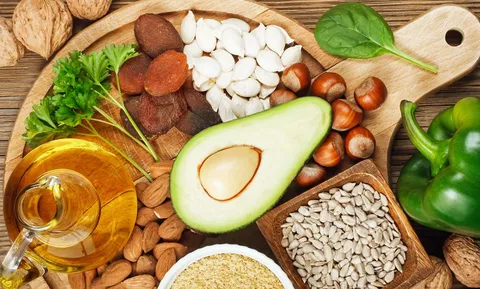Skin regeneration is a natural process that allows the skin to repair and renew itself. This vital function helps maintain a youthful appearance, heal wounds, and combat the effects of environmental stressors. Vitamins play a crucial role in supporting and enhancing skin regeneration. In this guide, we will explore the importance of various vitamins in skin health, how they contribute to skin regeneration, and practical ways to incorporate these vitamins into your daily routine.
Understanding Skin Regeneration
The Skin’s Structure and Function
The skin is the largest organ in the human body and serves as a protective barrier against external factors. It comprises three main layers:
- Epidermis: The outermost layer, responsible for protection and hydration.
- Dermis: The middle layer, containing collagen and elastin fibers that provide strength and elasticity.
- Hypodermis: The deepest layer, consisting of fat and connective tissue.
Skin regeneration occurs primarily in the epidermis, where new skin cells are produced and gradually move to the surface, replacing old or damaged cells.
The Skin Regeneration Process
Skin regeneration involves several key steps:
- Cellular Proliferation: New skin cells are produced in the basal layer of the epidermis.
- Migration: These new cells move upward, replacing older cells.
- Differentiation: As cells migrate, they undergo changes to become specialized skin cells.
- Shedding: Old cells are shed from the surface, revealing fresh, new skin.
Factors Affecting Skin Regeneration
Several factors can influence the skin’s ability to regenerate, including:
- Age: As we age, the skin’s regenerative capacity decreases.
- Nutrition: A diet rich in essential vitamins and nutrients supports healthy skin regeneration.
- Hydration: Adequate hydration is crucial for maintaining skin health and facilitating regeneration.
- Sleep: Quality sleep is essential for optimal skin repair and renewal.
- Environmental Factors: UV exposure, pollution, and harsh weather can damage the skin and impair regeneration.
Essential Vitamins for Skin Regeneration
Vitamin A
Role in Skin Health
Vitamin A, also known as retinol, is a powerful antioxidant that plays a critical role in skin health. It promotes cell turnover, encourages collagen production, and helps maintain skin elasticity.
Sources of Vitamin A
You can obtain vitamin A from various dietary sources, including:
- Animal Products: Liver, eggs, and dairy products.
- Plant-Based Sources: Carrots, sweet potatoes, and leafy greens contain beta-carotene, which the body converts to vitamin A.
Benefits for Skin Regeneration
Vitamin A accelerates skin cell turnover, which is essential for shedding old, damaged cells and replacing them with new, healthy ones. It also stimulates collagen production, enhancing skin firmness and reducing the appearance of fine lines and wrinkles.
Vitamin C
Role in Skin Health
Vitamin C is a potent antioxidant that helps protect the skin from oxidative stress caused by free radicals. It is also crucial for collagen synthesis, which is essential for maintaining skin structure and elasticity.
Sources of Vitamin C
Rich sources of vitamin C include:
- Citrus Fruits: Oranges, lemons, and grapefruits.
- Berries: Strawberries, blueberries, and blackberries.
- Vegetables: Bell peppers, broccoli, and Brussels sprouts.
Benefits for Skin Regeneration
Vitamin C boosts collagen production, which helps repair and regenerate skin tissues. It also enhances the skin’s natural defense mechanisms, protecting it from environmental damage and promoting a more youthful appearance.
Vitamin E
Role in Skin Health
Vitamin E is a fat-soluble antioxidant that protects the skin from oxidative damage and supports the immune system. It helps maintain the skin’s moisture barrier and promotes healing.
Sources of Vitamin E
Common sources of vitamin E include:
- Nuts and Seeds: Almonds, sunflower seeds, and hazelnuts.
- Oils: Olive oil, sunflower oil, and wheat germ oil.
- Leafy Greens: Spinach and kale.
Benefits for Skin Regeneration
Vitamin E supports skin regeneration by protecting cells from damage and reducing inflammation. It also helps maintain skin hydration, which is essential for healthy, resilient skin.
Vitamin D
Role in Skin Health
Vitamin D is essential for overall health and plays a specific role in skin health by promoting cell growth, repair, and metabolism. It also has anti-inflammatory properties that can help soothe irritated skin.
Sources of Vitamin D
You can obtain vitamin D from:
- Sunlight: The body produces vitamin D when exposed to sunlight.
- Diet: Fatty fish, fortified dairy products, and egg yolks.
- Supplements: Vitamin D supplements can help maintain adequate levels, especially in areas with limited sunlight.
Benefits for Skin Regeneration
Vitamin D supports the skin’s immune system and promotes cell renewal. It can help repair damage and maintain a healthy skin barrier, contributing to smoother, more resilient skin.
Vitamin K
Role in Skin Health
Vitamin K is known for its role in blood clotting, but it also contributes to skin health by supporting wound healing and reducing bruising and dark circles under the eyes.
Sources of Vitamin K
You can find vitamin K in:
- Leafy Greens: Kale, spinach, and broccoli.
- Fermented Foods: Natto, sauerkraut, and fermented dairy products.
Benefits for Skin Regeneration
Vitamin K promotes the healing of wounds and bruises, making it essential for skin repair. It also helps maintain healthy blood circulation, which is vital for delivering nutrients to the skin.
Incorporating Vitamins into Your Skincare Routine
Topical Applications
Vitamin A (Retinoids)
Topical retinoids are available in various forms, including creams, gels, and serums. They are highly effective in promoting cell turnover and reducing signs of aging. However, they can be irritating, so it’s essential to start with a lower concentration and gradually increase usage.
Vitamin C Serums
Vitamin C serums are popular for their brightening and anti-aging effects. They can be applied daily to protect the skin from environmental damage and boost collagen production.
Vitamin E Oils and Creams
Vitamin E can be found in many moisturizers and oils. It helps lock in moisture and protect the skin from oxidative stress. It’s particularly beneficial for dry or sensitive skin.
Dietary Intake
Balanced Diet
A balanced diet rich in fruits, vegetables, nuts, seeds, and lean proteins provides a broad spectrum of essential vitamins. Incorporating a variety of these foods ensures that you get the necessary nutrients for skin regeneration.
Supplements
While it’s best to obtain vitamins from food, supplements can help fill nutritional gaps. Consult with a healthcare professional to determine the appropriate supplements and dosages for your needs.
Lifestyle Factors
Hydration
Drinking plenty of water is crucial for maintaining skin hydration and supporting cellular functions. Aim for at least eight glasses of water a day.
Sleep
Adequate sleep is essential for skin regeneration. During sleep, the body repairs and renews skin cells. Aim for 7-9 hours of quality sleep each night.
Sun Protection
Protecting your skin from UV damage is vital. Use broad-spectrum sunscreen daily, even on cloudy days, to prevent premature aging and support healthy skin regeneration.
Frequently Asked Questions
How do vitamins contribute to skin regeneration?
Vitamins play various roles in skin regeneration, including promoting cell turnover, stimulating collagen production, and protecting against oxidative stress. They provide the necessary nutrients for repairing and renewing skin cells.
Can I use topical vitamins for skin regeneration?
Yes, topical vitamins like retinoids (vitamin A), vitamin C serums, and vitamin E oils can be highly effective in supporting skin regeneration. They provide direct benefits to the skin and can enhance your overall skincare routine.
What are the best dietary sources of vitamins for skin health?
A diet rich in fruits, vegetables, nuts, seeds, and lean proteins provides a wide range of essential vitamins for skin health. Specific sources include citrus fruits, leafy greens, nuts, seeds, fatty fish, and fortified dairy products.
Is it necessary to take vitamin supplements for skin regeneration?
While it’s best to obtain vitamins from food, supplements can help fill nutritional gaps, especially if your diet is lacking in certain nutrients. Consult with a healthcare professional to determine if supplements are necessary for your needs.
How does hydration affect skin regeneration?
Hydration is crucial for maintaining skin health and supporting cellular functions. Proper hydration ensures that the skin remains supple and resilient, facilitating effective regeneration and repair.
How can I incorporate vitamin-rich foods into my diet?
Incorporate a variety of fruits, vegetables, nuts, seeds, and lean proteins into your meals. Smoothies, salads, and balanced meals are excellent ways to ensure you get a broad spectrum of vitamins.
What lifestyle factors can enhance skin regeneration?
Key lifestyle factors that enhance skin regeneration include proper hydration, adequate sleep, a balanced diet, and sun protection. These factors support overall skin health and facilitate effective regeneration.
How do antioxidants support skin regeneration?
Antioxidants protect the skin from oxidative stress caused by free radicals. They neutralize these harmful molecules, preventing damage to skin cells and promoting a healthier, more youthful appearance.
Can vitamin deficiencies affect skin regeneration?
Yes, vitamin deficiencies can impair skin regeneration and lead to various skin issues, including dryness, dullness, and a compromised skin barrier. Ensuring adequate vitamin intake is essential for maintaining healthy skin.
How long does it take to see the effects of vitamins on skin regeneration?
The effects of vitamins on skin regeneration can vary depending on individual factors and the specific vitamins used. Generally, it may take several weeks to a few months of consistent use to notice significant improvements in skin health and appearance.
Conclusion
Vitamins play a pivotal role in supporting and enhancing skin regeneration. By incorporating a balanced diet, using topical applications, and adopting healthy lifestyle habits, you can ensure that your skin receives the essential nutrients it needs to repair, renew, and maintain a youthful, radiant appearance. Prioritizing skin health through proper vitamin intake is a proactive approach to achieving long-term beauty and wellness.
- Botox Nasal Flare Treatment In Sunbury-on-Thames, Surrey - May 3, 2025
- How To Get Rid Of Lip Filler Swelling Fast - May 2, 2025
- Exosome Therapy For Skin Rejuvenation Near Sidlow Bridge, Surrey - May 2, 2025


